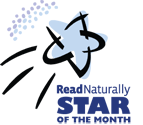Comprehension gives the act of reading a purpose and opens the door to enjoyment of reading. Indeed, deriving meaning from text is why we bother reading at all! Yet comprehension can be a struggle for any student, but often it’s especially challenging for multilingual students. What can we do to set them up for success in Read Naturally Live and Read Naturally Live—Español?
Read more What kind of learning can happen on the first day of school? Naturally, students will learn who you are, the rules of your classroom, and where to put their materials. Our hope is that they will do some effective work toward their literacy goals too. Is it realistic to expect this on day one? With One Minute Reader Live, it certainly is!
Read more In their daily lives, most adults read silently far more frequently than they read aloud. The same is true of older students. Silent reading comprehension is, after all, the skill needed to perform well on tests and in academics in general. Does this mean teachers of older students should stop spending time on oral reading fluency? Literacy expert Dr. Tim Shanahan addresses this question in his blog post, Fluency Instruction for Older Kids, Really? We completely agree with his response—and so does the research.
Read more I'll never forget the time my middle child, at age four, found a flashcard with the word “flabbergasted” on it. I read the card to him and told him the meaning of the word. He started bringing the card everywhere he went and belly laughing whenever he showed it to someone. Some nights, he even slept with it under his pillow.
Read more To achieve fluency, a student must read with appropriate rate, expression, and accuracy. All three components are required for fluency, but are they equally important? Jan Hasbrouck, Ph.D., is a reading researcher and Read Naturally supporter who has devoted her career to studying fluency. In this guest post, she discusses accuracy as the foundational component of fluency.
Read more One of the criteria for passing a Read Naturally story is that students need to answer all the comprehension questions correctly. When teachers learn of this requirement, they tend to have a few questions. Here are the most frequently asked questions about our comprehension requirement, along with answers from our curriculum experts.
Read more As you know, students will make optimal reading progress when they work in material at the appropriate level. The problem is that the definition of “appropriate level” changes depending on the context. When should you give students material at their independent level? How about their instructional level? What is the difference between the two? And is it ever appropriate to let them work at their frustration level? If you’ve ever found yourself asking these questions—or if you find yourself needing to explain these concepts to parents—you’ve come to the right place! We’re here to break it down for you.
Read more To advance literacy worldwide over the next decade, what topics do educators need to focus on? The International Literacy Association (ILA) recently put this question out to 1,443 literacy professionals from 65 countries and territories in the 2020 What’s Hot in Literacy survey. With the ultimate goal of better outcomes for students, this reputable report highlights the most critical topics in literacy and identifies areas that need more support.
Read more The other day, my son asked me why blizzards are hazardous. The most interesting part of his question was the way he said the word hazardous. He pronounced it incorrectly, with a long a: HAYzardous. This told me he’d never heard the word spoken aloud before. However, when I probed him on the word’s meaning, he knew it exactly. How?
Read more My first grader came to the last section of his “Halloween word problems” math worksheet yesterday and let out a giant groan. The instruction was, “Now write a Halloween word problem of your own.” It was challenging enough for him to read and then solve the problems. Now he had to write one, too? “But writing takes forever!” he complained.
Read more  Share your student’s success story—nominate him or her for our Star of the Month award. Win a Barnes & Noble gift card for the student and a Read Naturally gift certificate for your class!
Share your student’s success story—nominate him or her for our Star of the Month award. Win a Barnes & Noble gift card for the student and a Read Naturally gift certificate for your class!